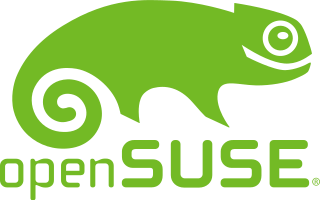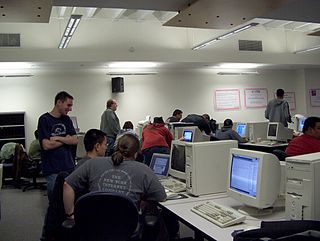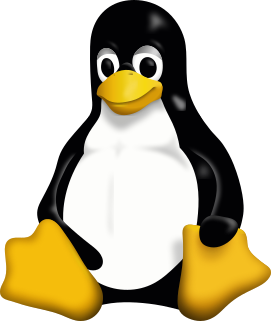Related Research Articles

GNU is an operating system and an extensive collection of computer software. GNU is composed wholly of free software, most of which is licensed under the GNU Project's own General Public License (GPL).

Gnumeric is a spreadsheet program that is part of the GNOME Free Software Desktop Project. Gnumeric version 1.0 was released on 31 December 2001. Gnumeric is distributed as free software under the GNU GPL license; it is intended to replace proprietary spreadsheet programs like Microsoft Excel. Gnumeric was created and developed by Miguel de Icaza, but he has since moved on to other projects. The maintainer as of 2002 was Jody Goldberg.
Gentoo Linux is a Linux distribution built using the Portage package management system. Unlike a binary software distribution, the source code is compiled locally according to the user's preferences and is often optimized for the specific type of computer. Precompiled binaries are available for some larger packages or those with no available source code.

The Linux Gazette was a monthly self-published Linux computing webzine, published between July 1995 and June 2011. Its content was published under the Open Publication License.

The GNU Project is a free software, mass collaboration project that Richard Stallman announced on September 27, 1983. Its goal is to give computer users freedom and control in their use of their computers and computing devices by collaboratively developing and publishing software that gives everyone the rights to freely run the software, copy and distribute it, study it, and modify it. GNU software grants these rights in its license.

A free and open-source graphics device driver is a software stack which controls computer-graphics hardware and supports graphics-rendering application programming interfaces (APIs) and is released under a free and open-source software license. Graphics device drivers are written for specific hardware to work within a specific operating system kernel and to support a range of APIs used by applications to access the graphics hardware. They may also control output to the display if the display driver is part of the graphics hardware. Most free and open-source graphics device drivers are developed by the Mesa project. The driver is made up of a compiler, a rendering API, and software which manages access to the graphics hardware.

openSUSE, formerly SUSE Linux and SuSE Linux Professional, is a Linux distribution sponsored by SUSE Software Solutions Germany GmbH and other companies. Its "Leap" variant shares a common code base with, and is a direct upgradable installation for the commercially-produced SUSE Linux Enterprise, effectively making openSUSE Leap a non-commercial version of the enterprise product. It is widely used throughout the world. The focus of its development is creating usable open-source tools for software developers and system administrators, while providing a user-friendly desktop and feature-rich server environment.
A proprietary device driver is a closed-source device driver published only in binary code. In the context of free and open-source software, a closed-source device driver is referred to as a blob or binary blob. The term usually refers to a closed-source kernel module loaded into the kernel of an open-source operating system, and is sometimes also applied to code running outside the kernel, such as system firmware images, microcode updates, or userland programs. The term blob was first used in database management systems to describe a collection of binary data stored as a single entity.

gNewSense is a Linux distribution based on Debian, and developed with sponsorship from the Free Software Foundation. Its goal is user-friendliness, but with all proprietary and non-free software removed. The Free Software Foundation considers gNewSense to be composed entirely of free software.

FreeBSD is a free and open-source Unix-like operating system descended from the Berkeley Software Distribution (BSD), which was based on Research Unix. The first version of FreeBSD was released in 1993. In 2005, FreeBSD was the most popular open-source BSD operating system, accounting for more than three-quarters of all installed simply, permissively licensed BSD systems.

Trisquel is a computer operating system, a Linux distribution, derived from another distribution, Ubuntu. The project aims for a fully free software system without proprietary software or firmware and uses a version of Ubuntu's modified kernel, with the non-free code removed. Trisquel relies on user donations. Its logo is a triskelion, a Celtic symbol. Trisquel is listed by the Free Software Foundation as a distribution that contains only free software.

Fedora is a Linux distribution developed by the community-supported Fedora Project which is sponsored primarily by Red Hat, a subsidiary of IBM, with additional support from other companies. Fedora contains software distributed under various free and open-source licenses and aims to be on the leading edge of free technologies. Fedora is the upstream source of the commercial Red Hat Enterprise Linux distribution.
The Linux Documentation Project (LDP) is an all-volunteer project that maintains a large collection of GNU and Linux-related documentation and publishes the collection online. It began as a way for hackers to share their documentation with each other and with their users, and for users to share documentation with each other. Its documents tend to be oriented towards experienced users such as professional system administrators, but it also contains tutorials for beginners.

A Linux User Group or Linux Users' Group (LUG) or GNU/Linux User Group (GLUG) is a private, generally non-profit or not-for-profit organization that provides support and/or education for Linux users, particularly for inexperienced users. The term commonly refers to local groups that meet in person, but is also used to refer to online support groups that may have members spread over a very wide area and that do not organize, or are not dependent on, physical meetings. Many LUGs encompass FreeBSD and other free-software / open source Unix-based operating systems.

Jami is a SIP-compatible distributed peer-to-peer softphone and SIP-based instant messenger for Linux, Microsoft Windows, OS X, iOS, and Android. Developed and maintained by the Canadian company Savoir-faire Linux, and with the help of a global community of users and contributors, Jami positions itself as a potential free Skype replacement.

The Linux kernel is a free and open-source, monolithic, Unix-like operating system kernel. It is deployed on a wide variety of computing systems, such as mobile devices, personal computers, servers, mainframes, supercomputers, embedded devices.

Parabola GNU/Linux-libre is an operating system for the i686, x86-64 and ARMv7 architectures. It is based on many of the packages from Arch Linux and Arch Linux ARM, but distinguishes from the former by offering only free software. It includes the GNU operating system components common to many Linux distributions and the Linux-libre kernel instead of the generic Linux kernel. Parabola is listed by the Free Software Foundation as a completely free operating system, true to their Free System Distribution Guidelines.
Docker is a set of platform as a service (PaaS) products that uses OS-level virtualization to deliver software in packages called containers. Containers are isolated from one another and bundle their own software, libraries and configuration files; they can communicate with each other through well-defined channels. All containers are run by a single operating system kernel and therefore use fewer resources than virtual machines.

Void Linux is an independent Linux distribution that uses the X Binary Package System (XBPS) package manager, which was designed and implemented from scratch, and the runit init system. Excluding binary kernel blobs, a base install is composed entirely of free software, but users can access an official non-free repository to install proprietary software.

Zephyr is a small real-time operating system for connected, resource-constrained and embedded devices supporting multiple architectures and released under the Apache License 2.0. Beyond its kernel, Zephyr includes all the components and libraries needed to develop a full application such as device drivers, protocol stacks, file systems, and firmware updates.
References
- ↑ Matthias Kalle Dalheimer; Matt Welsh (22 December 2005). Running Linux. O'Reilly Media, Inc. p. 927. ISBN 978-0-596-55300-5 . Retrieved 12 September 2016.
- 1 2 3 "About Us". LinuxFocus.org. Retrieved 18 December 2016.